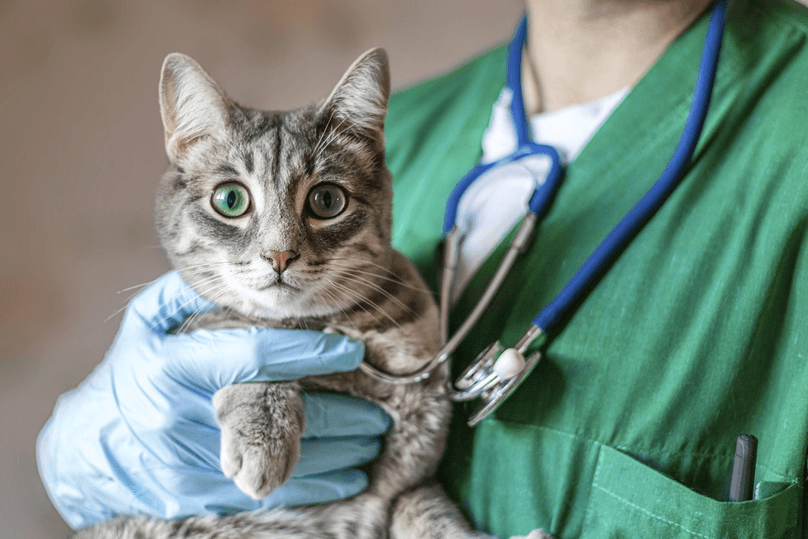
If anything is certain, it’s that having a pet isn’t cheap. As your kitten matures, they will need to visit the vet to get all of their required shots, get spayed or neutered, go to a routine check-up, and once they reach maturity, see a vet to detect any problems. Beyond routine grooming and cat food, owners find that check-ups, vaccinations, testing, spaying/neutering, emergency visits, and geriatric care can make the cost of ownership skyrocket.
Taking your cat to the vet for preventative treatment and care is essential to their well-being. While every cat will not have the same health requirements, and veterinary costs largely vary depending on the region and the type of visit, there are some veterinary basics you should expect to pay for. Here we will review common vet costs for cats, and why having health coverage for your cat is well worth the investment.
Plan for Vet Check-Ups In Your Budget
During a check-up, your veterinarian will provide a thorough physical exam to check hearing, vision, teeth, gums, skin and coat, and more. Routine check-ups are something you will need to plan for in your budget. One of the best ways to ensure your cat lives a long and healthy life is to keep up to date with appointments, vaccines, and your cat’s habits and health overall. If anything about your cat seems different, it will be worth bringing attention to it during this appointment.
Cat Vaccinations
Cats commonly require core vaccinations for rabies, feline herpes, and feline leukemia. Following the right vaccination and booster schedule is essential for their health. Some vaccinations, such as rabies, are even required by law. It is important to consider that most cat vaccinations require more than a single dose, sometimes up to three.
Dental Cleaning for Cats
Pet dental care is a crucial aspect of maintaining your furry friend’s health. Some feline teeth require extra attention, bringing up the cost of vet bills. Cats are especially prone to dental diseases, like gingivitis, periodontal disease, and tooth resorption. Annual dental appointments remain the best way to clean hard-to-reach places.
Allergy Test for Cats
Did you know sneezing, coughing, licking, and itching can all be signs of allergies in your cat? Skin tests can help improve the quality of life for your cat.
Spaying and Neutering
This medical decision has many great benefits for your feline friend. Not only are spayed or neutered cats better behaved, but uterine infections, uterine cancers, and breast cancer can be further prevented. Kittens as young as eight weeks old are eligible for this procedure. Prices vary greatly depending on breed, age, size, health status, and location.
Wellness Exams
Your cat will need an annual checkup to make sure their health is on track. Your average wellness exam includes a dental check and blood work, which can vary in price depending on what your vet recommends.
Build Your Savings to Protect Against the Unexpected
Flea Control Medication
If your cat gets fleas, it is likely they will need monthly medication — whether it be shampoos, sprays, powders, topical, or oral medications. If your cat brings fleas home, the cost could easily multiply.
Ear Infection Protection
For cats, the ear canal is very sensitive. If your cat is shaking their head or scatching their ear, they are likely overdue for an ear exam. A careful diagnosis of the cause will be needed to determine the level of care.
Heartworm Prevention
When it comes to heartworm disease for cats, prevention is always the best option. If treatment is needed, it should be prescribed and administered as soon as possible. While cats are much less likely than dogs to have adult heartworms, prevention is the only means of protecting cats from heartworm disease. The best way to protect your feline friend from heartworm disease is with regular medication, prescribed by your veterinarian at your vet visit.
Geriatric Health Solutions
Like people, your cat also experiences aging in unique ways. As your cat ages, their immune system becomes weaker, they might develop arthritis, high blood pressure, diabetes, cancer, and less mobile. By the time your cat reaches 7 years of age, they will need x-rays, bloodwork, and additional screening to stay ahead of age-related diseases.
Emergency Visits
You never know when your feline friend might end up in an accident, whether it be from old age or happenstance. Emergency visits tend to be more expensive than routine visits, though costs vary case by case. Different diagnostic tests and exams may be expected, from X rays to ultrasounds, and blood work, which might necessitate surgery, medication, or hospitalization.
Covering Veterinary Costs
Staying on top of routine check-ups, ensuring your cat stays vaccinated, and attending to routine preventative care becomes increasingly important as your cat grows older. While not every disease or circumstance can be prevented, being a responsible cat owner and making regular vet visits improves your pets quality of life and increases their chances of living a long and happy life.
Learning to Budget Like a Responsible Cat Owner
While staying on top of preventive care is essential, vet costs for cats often add up. If you find yourself trying to manage costs, consider building a savings account to cover your cat’s veterinary bills and potential emergencies. For many, however, having a savings account for their veterinary expenses isn’t enough. When you have cat insurance, up to 90% of the cost can be covered, saving you the pain of paying out of pocket if something unexpected happens.
With any plan, you pay for the veterinary care up front and your pet insurance company will reimburse you for their percentage of the covered costs. Since pre-existing conditions are not covered in many plans, it is best to purchase cat insurance while your cat is young. With both a savings account and cat insurance, you will be financially prepared to handle unplanned expenses.
For health-related issues, please consult with your pet’s veterinarian first.